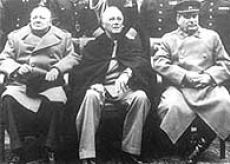
At the end of the Second World War the 'Grand Alliance' between Britain, France and the USA (the Western forces) with Russia, the Soviet Union (the Eastern force) began to fall apart. Their common enemy Hitler and Nazi Germany had been defeated and now the war time allies began to turn on one another in what became the Cold War, the longest war in History where no one was really hurt. The Grand Alliance began to breakdown as early as August 1941 four years before the war had even ended as Prime Minister Winston Churchill of Great Britain and President Franklin D. Roosevelt of the US met to discuss allied plans for the post war world. The US did not officially join the Second World War until December 1941 whilst Russia had been fighting since 1939 but Stalin was not involved in the discussions despite being allied with the West. By the time the war ended in 1945 the Western and Eastern powers had drawn further and further apart. Russia had lost more men to the war than every other nation combined and thriced and had suffered very heavy casualties in the First World War also. Therefore they wanted to secure some Eastern European nations such as Poland, HUngary, Romania and Yugoslavia as 'buffer zones' which meant that if an army was marching on Russia they would first have to move through the countries surrounding Russia owned by the Soviet Union or USSR (The Union of Soviet Socialist Republics) thus giving Russia time to mobilise their troops and not be caught off guard like when Germany had invaded them in both the world wars.
The West argued that the Soviet Union was trying to expand and become more powerful than them (in particular, the USA). Meanwhile the Western forces had the atomic bomb which Russia did not yet have in the East, a destructive weapon that gave the West a lot of bargaining power over the East in negotiations. The main problem was what to do with Germany, the conquered nation as France and Russia wanted the German military dispanded after suffering the most in the two world wars whilst Britain and the US saw a trade oppurtunity in preserving some German strength and using them as a buffer against Russia in the East. In the end Germany was split between Western and Eastern forces and the continuing different interpretations of who could and couldn't have what nation led to a cold war (a war of ideals and threats) between the USA and the USSR. During this time there was a war in Korea, Vietnam and Afghanistan as well as several other conflicts between pro USSR and pro USA governments such as the crisis in Cuba and the corruption in Nicaragua. This breakdown of an alliance was largely due to different perceptions (viewpoints) of the same event and this is often the case in History. Sometimes it is wisest to not just accept that what someone teaches you is true but to consider why the events happened and how they could have been different. History is so interesting because there are so many possiblities and things we do not or may not know entirely.

0 Comment:
Be the first one to comment on this article.